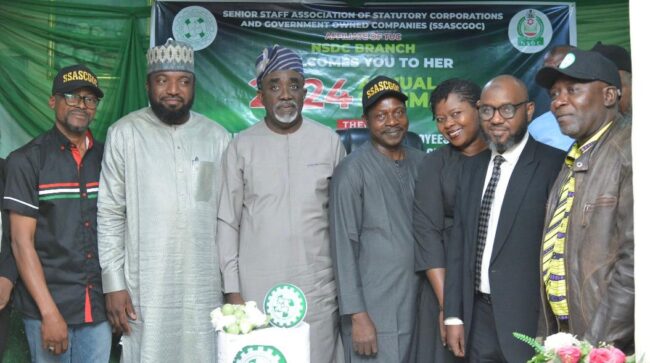The Deputy Chairman, House of Representatives’ Committee on Finance, Honourable Saidu Abdul, has called for urgent action on Nigeria’s vast sugar production potential to boost the economy.
Hon. Abdul made the call on Monday in Abuja at the 2024 Annual Summit of the Senior Staff Association of Statutory Corporations and Government-Owned Companies (SSASCGOC), affiliated with the Trade Union Congress (TUC).
The summit, which was organised by the National Sugar Development Council’s (NSDC) Branch of SSASCGOC, was themed “Labour Unions: The Voice of the Employees in Policy Development and Productivity Growth.”
While speaking further, he said, Nigeria spent over 2.7 trillion naira on sugar imports between 2012 and 2022; however, the National Sugar Development Council’s master plan aims to cultivate 250,000 hectares of land, a goal that Niger State alone can meet, and local sugar production can generate $1 billion annually.
Hon. Abdul also emphasised the importance of periodic assessments of progress, collaboration between lawmakers and technocrats, import substitution policies, and supporting local industries.
He pointed out that Brazil’s sugar industry is a model for Nigeria, generating more revenue than Nigeria’s entire budget.
He also stressed the need to replicate this model, citing his recent visit to Brazil, where he witnessed the country’s thriving sugar economy.
Abdul acknowledged challenges facing Nigeria’s sugar industry, including inadequate infrastructure, limited funding, and inefficient policies.
To address these challenges, he proposed investing in infrastructure development, providing incentives for investors, and reviewing policies.
Abdul, therefore, pledged support for initiatives driving economic growth and urged collective action. “We must seize opportunities, work together, and make life better for Nigerians.”
In his welcome address, the Executive Secretary of NSDC, Kamar Barkin, noted that the summit’s theme, which emphasises the voice of employees in policy development, growth, and productivity, is apt as the NSDC is currently at a critical stage in implementing Phase II of the Nigeria Sugar Master Plan (NSMP).
In this phase, he explained that it aims to fully develop the sugar industry, achieve self-sufficiency in production, and create more jobs, especially in the rural areas.
The ES also disclosed that the NSDC has declared 2025 as a year of accelerated sugar project development in the country.
Also speaking, the former vice president of NSDC-SSASCGOC, Sa’ad Aminu Usman, highlighted SSASCGOC’s core values, including productivity, partnership, and capacity building.
He said, “Productivity is key, but it requires capacity building. The workers are critical stakeholders in economic growth, managing resources effectively.”
Citing personal experience, he shared successes in improving revenue generation and negotiating better conditions of service.
“We increased our internally generated revenue (IGR) significantly, and our condition of service improved accordingly,” he said.
He, therefore, encouraged members to explore entrepreneurial ventures, utilising constitutional provisions allowing civil servants to engage in farming, agriculture, and other businesses, adding that salary income alone cannot sustain them.
Meanwhile, the President of NSDC-SSASCGOC, Suleiman Mohammed Kabir, noted that in the developing landscape of labour relations, the role of unions has never been more critical.
He said, “We serve as the indispensable voice for our members, advocating for their rights and well-being while striving to influence policies that shape our industry.
“Today, we will explore how unions can effectively engage in policy development processes, ensuring that the needs and aspirations of the workforce are front and centre in discussions that impact productivity and growth.”
“As we dig into our discussions, let us not forget the collective power we hold. The conversations we have will shape not only workplace policies but also the future of the sugar sector itself.”
“Our commitment to collaboration and dialogue will empower us to spearhead initiatives that drive meaningful change, enhance productivity, and ultimately contribute to the overall growth of our national economy.”
READ MORE FROM: NIGERIAN TRIBUNE
Get real-time news updates from Tribune Online! Follow us on WhatsApp for breaking news, exclusive stories and interviews, and much more.
Join our WhatsApp Channel now
